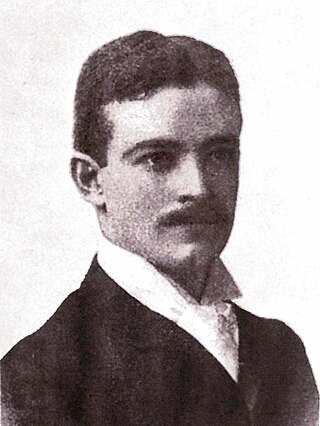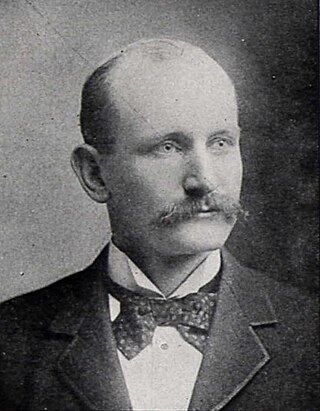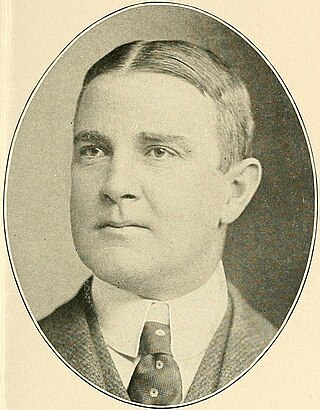Related Research Articles

William Walter "Pudge" Heffelfinger, also spelled Hafelfinger, was an American football player and coach. He is considered the first athlete to play American football professionally, having been paid to play in 1892 for the Allegheny Athletic Association.

Knowlton Lyman "Snake" Ames was an American football player and coach. He played for Princeton University from 1886 to 1889, and the Chicago Athletic Association, in 1892. Playing for the Princeton Tigers, Ames was selected to the 1889 College Football All-America Team as a fullback. In 1891 and 1892, he was the head football coach at Purdue University. He is also credited as the first head football coach at Northwestern University.
The Allegheny Athletic Association was an athletic club that fielded the first ever professional American football player and later the first fully professional football team. The organization was founded in 1890 as a regional athletic club in Allegheny, Pennsylvania, which is today the North Side of Pittsburgh.
The PittsburghAthletic Club football team, established in 1890, was based in Pittsburgh, Pennsylvania. In 1892 the intense competition between two Pittsburgh-area clubs, the Allegheny Athletic Association and the Pittsburgh Athletic Club, led to William (Pudge) Heffelfinger becoming the first known professional football player. Heffelfinger was paid $500 by Allegheny to play in a game against Pittsburgh on November 12, 1892. As a result, Heffelfinger became the first person to be paid to play football. Allegheny would go on to win the game, 4–0, when Heffelfinger picked up a Pittsburgh fumble and ran it 35 yards for a touchdown. In 1893, Pittsburgh again made history when it signed one of its players, probably halfback Grant Dibert, to the first known pro football contract, which covered all of the team's games for the year.

William Castle Rhodes was American football player and coach. Rhodes played tackle at Yale University from 1887 to 1890 and was selected for the 1890 College Football All-America Team. After playing for the Cleveland Athletic Club and coaching at Western Reserve in 1891, Rhodes return to his alma mater to serve as head coach for the Yale Bulldogs football team in 1893 and 1894, compiling a record of 26–1. Rhodes' 1894 team won all 16 of its games and was later recognized as a national champion by a number of selectors.
Benjamin Shenstone "Sport" Donnelly was an American football player and coach. He was the second-ever known professional football player, after Pudge Heffelfinger. He was paid $250 for one game on November 19, 1892 by the Allegheny Athletic Association, for a game against the Washington & Jefferson Presidents football team. The November 19 date was exactly seven days after the team paid Heffelfinger $500 for a game. In 1893, Donnelly was hired by the Allegheny Athletic Association as player-coach, making him the first man to ever coach a known pro team. Heffelfinger once said that Donnelly was the only man that he had played against who "could slug you and at the same time keep his eyes on the ball". Donnelly also served as the second head football coach at the University of Iowa for a single season in 1893, compiling a record of 3–4.

The Chicago Athletic Association was an American football team, based in Chicago, Illinois. The club itself had been organized in 1890, and in 1892 it formed a football team. The team was built around veterans of Chicago's University Club football team.
Grant Dibert was an early professional football player with the Pittsburgh Athletic Club and the Allegheny Athletic Association. As a fullback, his primary team was the Pittsburgh Athletic Club, whom he played for from the team's founding in 1890 until 1893. Prior to his professional career, Dibert played college football at Swarthmore College.

Professor Louis Frederick Kirchner, misnamed in some posthumous sources as William Kirschner, was an early football player and physical instructor for the Pittsburgh Athletic Club. He may, or may not, have been one of the earliest professional football players. Even though he had never played football before 1890, he had the ability to learn and adapt to the game quickly. During the 1890s he was viewed as one of the best offensive linemen in Pennsylvania.
The 1898 Western Pennsylvania All-Star football team was a collection of early football players, from several teams in the area, to form an all-star team. The team was formed by Dave Berry, the manager of the Latrobe Athletic Association, for the purpose of playing the Duquesne Country and Athletic Club, which fielded a team composed of many of the game's stars from the era. The game between the two clubs ended in a 16-0 Duquesne victory and is considered to be the first all-star game for professional football. Contrary to popular belief, while the game was held at Exposition Park, which would be currently located inside of the city limits of Pittsburgh, Pennsylvania, the 1898 location of the game was Allegheny, Pennsylvania which was not incorporated into the city of Pittsburgh until 1907.

Charles Elmer Aull was an early professional football player. He played professionally for the Pittsburgh Athletic Club. He also played college football from 1889 until 1891 for the Penn State Nittany Lions. He was born in Pittsburgh in 1869. He died in Ohio in 1958.

Augustus Clement Read was a college football player and the captain of the Penn State Nittany Lions football team, and a college shot putter. He was from Delano, Pennsylvania.

John Albert "Burt" Aull was an early football player with the Pittsburgh Athletic Club, prior to the club's hiring of professional football players.

JohnMoore Van Cleve was an American football player and coach. He became one of the earliest known people paid to play the sport when he, Ollie Rafferty, and Peter Wright signed contracts with the Allegheny Athletic Association for $50 per game for the entire 1893 season. Only Pudge Heffelfinger and Sport Donnelly are known to have been professionals earlier.

Joseph Clifton Trees was a college football player at the University of Pittsburgh, the first athlete to receive an athletic subsidization at the school, and, possibly, an early professional football player. He later made millions of dollars in the oil industry and became a trustee and significant benefactor to the university and its athletic department. His hobbies included philanthropy, scientific research and agriculture. His 2,600-acre (11 km2) estate in Gibsonia, Pennsylvania was devoted to a large extent to fruit trees.

William J. Kountz Jr. was an American businessman and an early football player and manager for the Allegheny Athletic Association. He gained brief fame as a humorist with his "Billy Baxter" letters.

John Moorhead Jr. was an American football player for Yale. He played alongside Walter Camp, the inventor of the modern game, during the late 1870s. He was also a member, and club president, of the Allegheny Athletic Association, an amateur football club which fielded the first recognized professional player Pudge Heffelfinger. When Allegheny formed a football team in 1890, he took over the position of center. Meanwhile a fellow former Yale player, O. D. Thompson, took over as the club's manager and played tackle.
American football in Western Pennsylvania, featuring the city of Pittsburgh and surrounding areas, has had a long and storied history, dating back to the early days of the sport. All levels of football, including high school football and college football, are followed passionately, and the area's National Football League (NFL) team, the Pittsburgh Steelers, is consistently one of the sport's most popular teams. Many of the NFL's top stars have come from the region as well, especially those that play quarterback, earning Western Pennsylvania the nickname "Cradle of Quarterbacks".
The Western Pennsylvania Professional Football Circuit was a loose association of American football clubs that operated from 1890 to approximately 1940. Originally amateur, professionalism was introduced to the circuit in 1892; cost pressures pushed the circuit to semi-professional status from about 1920 through the rest of its existence. Existing in some form for 48 years, it was one of the longest-lived paying football loops to operate outside the auspices of the National Football League.
The 1893 Allegheny Athletic Association football season was the fourth season of competition for the American football team representing the Allegheny Athletic Association. Managed by O. D. Thompson and coached by Ben "Sport" Donnelly, the team compiled a record of 4–3.
References
- PFRA Research. "Last Hurrah in Allegheny" (PDF). Coffin Corner. Professional Football Researchers Association: 1–3. Archived from the original (PDF) on 2010-11-26.
- PFRA Research. "Five Hundred Reasons" (PDF). Coffin Corner. Professional Football Researchers Association: 1–6. Archived from the original (PDF) on 2010-09-29.
- PFRA Research. "Three A's for Football" (PDF). Coffin Corner. Professional Football Researchers Association: 1–4. Archived from the original (PDF) on 2010-09-29.
- PFRA Research (1999). "Long history of legends surrounds 'The Game'" (PDF). Yale Bulletin and Calendar. Yale University. 28 (13): 1–4. Archived from the original (PDF) on 2010-09-29.
- PFRA Research. "A Weekly Wage" (PDF). Coffin Corner. Professional Football Researchers Association: 1–4. Archived from the original (PDF) on 2010-11-26.
- Yale's Walter Camp and 1870s Rugby
- ↑ Williams, Frederick Wells (1906). A History of the Class of Seventy-Nine:Yale College, During the Thirty Years from its Admission into the Academic Department, 1875-1905. The University Press. pp. 434, 435.
- ↑ Obituary Record of Graduates of Yale University. Yale University. 1925.